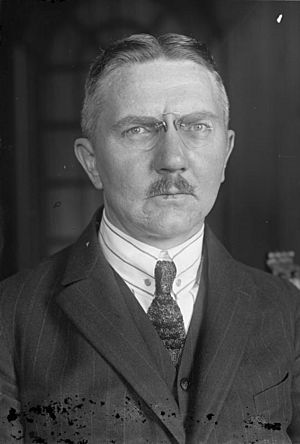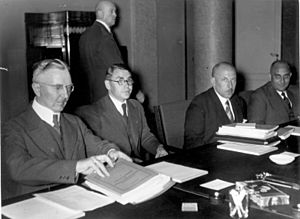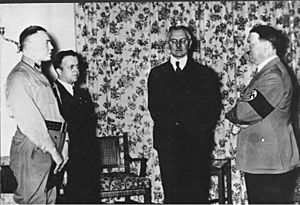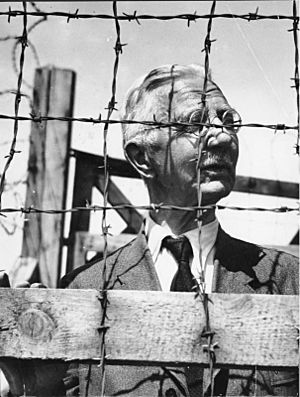Hjalmar Schacht facts for kids
Quick facts for kids
Hjalmar Schacht
|
|
|---|---|
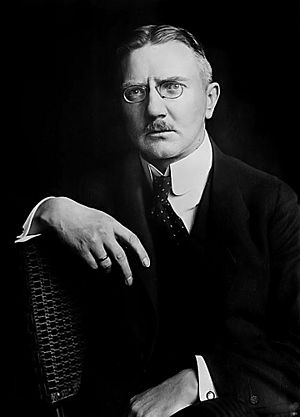 |
|
| Reichsminister of Economics | |
| In office 3 August 1934 – 26 November 1937 |
|
| President | Adolf Hitler (as Führer) |
| Chancellor | Adolf Hitler |
| Preceded by | Kurt Schmitt |
| Succeeded by | Hermann Göring |
| General Plenipotentiary for War Economy | |
| In office 21 May 1935 – 26 November 1937 |
|
| Preceded by | Office established |
| Succeeded by | Walther Funk |
| President of the Reichsbank | |
| In office 12 November 1923 – 7 March 1930 |
|
| Preceded by | Rudolf E. A. Havenstein |
| Succeeded by | Hans Luther |
| In office 17 March 1933 – 20 January 1939 |
|
| Preceded by | Hans Luther |
| Succeeded by | Walther Funk |
| Reichsminister without Portfolio | |
| In office 26 November 1937 – 22 January 1943 |
|
| Personal details | |
| Born |
Horace Greeley Hjalmar Schacht
22 January 1877 Tinglev, German Empire |
| Died | 3 June 1970 (aged 93) Munich, West Germany |
| Resting place | Munich Ostfriedhof |
| Political party |
|
| Spouses |
Luise Sowa
(m. 1903; died 1940)Manci Vogler
(m. 1941) |
| Children | Cordula Schacht |
| Profession | Banker, economist |
| Awards | Golden Party Badge |
| Signature |  |
Hjalmar Schacht (born Horace Greeley Hjalmar Schacht; 22 January 1877 – 3 June 1970) was a German economist and banker. He helped start the German Democratic Party in 1918. He was important in Germany's government during the Weimar Republic and under Adolf Hitler.
Schacht served as the President of the Reichsbank (Germany's central bank) from 1933 to 1939. He was also the Minister of Economics from 1934 to 1937. He was praised for helping Germany's economy recover after World War I.
However, he disagreed with Hitler's plans for re-arming Germany. He thought it would hurt the economy. This led to disagreements with Hitler and Hermann Göring. He left his main roles by 1939.
In 1944, he was arrested by the Gestapo after a failed attempt to assassinate Hitler. He was held in concentration camps. Near the end of the war, he was freed by Allied forces. After the war, he was tried at Nuremberg but was found not guilty. He later started his own bank and advised developing countries on their economies.
Contents
Early Life and Education
Hjalmar Schacht was born in Tingleff, German Empire, which is now in Denmark. His parents had lived in the United States. They first wanted to name him Horace Greeley Schacht, after an American journalist. But his grandmother insisted on a Danish name.
Schacht went to the Gelehrtenschule des Johanneums for high school. He then studied many subjects at different universities. These included medicine, languages, political science, and finance. He earned his doctorate in 1899.
Banking Career and Public Service
Schacht started working at the Dresdner Bank in 1903. In 1905, he traveled to the United States. There, he met famous banker J. P. Morgan and U.S. President Theodore Roosevelt. He became a deputy director at Dresdner Bank.
During World War I, Schacht worked for the German government in Belgium. He helped manage money for Germany's purchases there. Later, he worked for other banks. In 1923, he tried to become head of the Reichsbank but was not chosen at first.
After the war, Germany formed the Weimar Republic. Schacht supported this new government. He helped create the German Democratic Party. He later became friends with Gustav Stresemann, another important politician.
Battling Hyperinflation
In November 1923, Germany faced a huge economic crisis called hyperinflation. Money became almost worthless. Schacht was made currency commissioner for the Weimar Republic. He helped introduce a new currency called the Rentenmark. This new money helped stabilize Germany's economy.
Because of his success, Schacht was appointed President of the Reichsbank. This was at the request of President Friedrich Ebert and Chancellor Gustav Stresemann.
In 1929, Schacht helped create the Young Plan. This plan changed how Germany would pay its war reparations from World War I. He resigned as Reichsbank president in March 1930. He then campaigned against war reparations in the United States.
Involvement with the Nazi Party
By 1926, Schacht had left the German Democratic Party. He became more supportive of the Nazi Party. He felt that Germany was not getting enough economic benefits from its ties with other countries. He also wanted Germany to regain its former territories and colonies.
Even though he was never a member of the Nazi Party, Schacht helped them raise money. He met with Adolf Hitler. After the November 1932 elections, Schacht and other leaders asked President Paul von Hindenburg to make Hitler Chancellor.
When Hitler became Chancellor in January 1933, Schacht was re-appointed as Reichsbank president.
In August 1934, Hitler made Schacht Germany's Minister of Economics. Schacht supported public works programs. These included building highways (autobahnen) to help reduce unemployment. He also introduced the "New Plan" in September 1934. This plan aimed to make Germany more economically independent. Schacht made trade agreements with countries in South America and southeastern Europe. This helped Germany get raw materials without using up its foreign money. He also found clever ways to fund government projects.
Schacht was given an honorary membership in the Nazi Party in 1937. He also received the Golden Party Badge.
Schacht disagreed with actions taken against Germany's Jewish people. In August 1935, he spoke out against Julius Streicher, a Nazi who wrote hateful articles.
During an economic crisis in 1935–36, Schacht urged Hitler to spend less on the military. He also wanted less government control over the economy. This put him against Hermann Göring, who wanted more military spending.
In November 1937, Schacht resigned as Minister of Economics. He was unhappy with Göring's lack of economic understanding. He also worried that Germany was heading towards bankruptcy. Hitler kept him in the government as a minister without a specific job. Schacht remained President of the Reichsbank until Hitler removed him in January 1939. He left the government completely in January 1943.
After the Kristallnacht in November 1938, Schacht spoke against the violence. He suggested a plan to help Jewish people leave Germany. This plan involved using Jewish property as security for loans to help them emigrate.
Resistance Activities
Schacht was in contact with people who resisted the Nazi regime as early as 1934. By 1938, he was actively involved in plans to overthrow Hitler if he started a war. He talked with other resistance figures.
However, Schacht remained in the government for a long time. After 1941, he did not take an active part in resistance efforts.
After the failed attempt on Hitler's life on 20 July 1944, Schacht was arrested. He was sent to concentration camps like Ravensbrück and Flossenbürg. Finally, he was moved to Dachau. In April 1945, he and other important prisoners were moved to Tyrol. They were freed by the Fifth U.S. Army on 5 May 1945.
After the War
Because Schacht had supported Hitler and held important positions, the Allies arrested him in 1945. He was put on trial at Nuremberg. He was accused of planning and waging aggressive wars.
Schacht said he was not guilty. He argued that he had lost all power before the war began. He also said he had been in contact with resistance leaders and had been imprisoned himself. The judges found him not guilty.
However, a German court later sentenced him to eight years in prison. This sentence was overturned on appeal, and he was freed in 1948.
In 1953, Schacht started his own bank called Deutsche Außenhandelsbank Schacht & Co.. He led this bank until 1963. He also advised leaders of developing countries on economic matters.
Hjalmar Schacht died in Munich, West Germany, on 3 June 1970.
Works
Schacht wrote many books during his life. Some of them were translated into English:
- The Stabilisation of the Mark (1927)
- The End of Reparations (1931)
- Account Settled/Abrechnung mit Hitler (1949)
- Confessions of the Old Wizard (1956)
- The Magic of Money (1967)
- My First Seventy-Six Years (autobiography) (1955)
Interesting Facts
- An American psychologist tested the IQ of Nazi leaders at Nuremberg. Schacht scored 143, which was the highest among them.
- When Schacht stabilized the German currency in 1923, his office was a very small room. His secretary described it as smelling of old cleaning cloths. She said he mostly telephoned people and smoked, working very late.
See also
 In Spanish: Hjalmar Schacht para niños
In Spanish: Hjalmar Schacht para niños
- Secret Meeting of 20 February 1933
 | Aaron Henry |
 | T. R. M. Howard |
 | Jesse Jackson |


